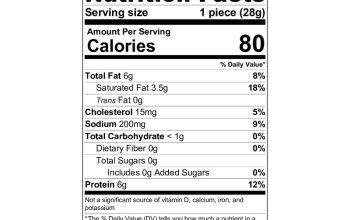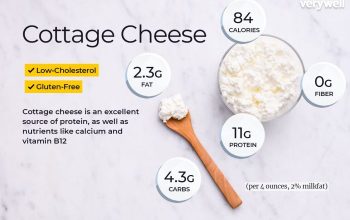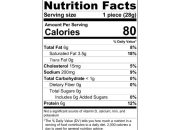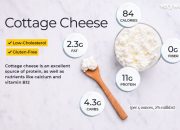Nutritional Composition of Alpine Lace Swiss Cheese

Alpine lace swiss cheese nutrition – Alpine Lace Swiss cheese offers a delicious and nutritious addition to any diet. Its creamy texture and subtly sweet flavor make it a versatile choice for snacks, sandwiches, and more. Let’s delve into the detailed nutritional breakdown to understand its contribution to a balanced lifestyle.
Macronutrient Composition per Serving
A standard serving of Alpine Lace Swiss cheese (approximately 1 ounce or 28 grams) provides a balanced mix of macronutrients. While exact values may vary slightly depending on the specific production batch, a typical serving contains approximately 80 calories, 7 grams of fat, 7 grams of protein, and 1 gram of carbohydrates. This translates to roughly 4% of the daily recommended value for carbohydrates, 14% for protein, and a variable percentage for fat depending on individual daily caloric needs.
It’s important to note that the percentage of daily values are based on a 2,000 calorie diet.
Key Micronutrients and Their Roles
Alpine Lace Swiss cheese is a good source of several essential micronutrients. Each serving provides a significant amount of calcium, contributing to strong bones and teeth. It also contains vitamin D, vital for calcium absorption and overall bone health. Riboflavin (vitamin B2), another micronutrient present, plays a crucial role in energy metabolism and maintaining healthy skin and eyes.
The precise amounts of these micronutrients will vary slightly depending on the production process and the age of the cheese. However, Alpine Lace Swiss consistently provides a beneficial amount of these key nutrients.
Fat Composition, Alpine lace swiss cheese nutrition
Alpine Lace Swiss cheese contains a mix of saturated, unsaturated, and trans fats. While the exact ratio varies, the majority of the fat content comes from saturated and unsaturated fats. Trans fats are generally present in minimal amounts. Understanding the different types of fat is important for making informed dietary choices. Saturated fats should be consumed in moderation as part of a balanced diet, while unsaturated fats are considered healthier options.
The small amount of trans fats found in most Swiss cheeses is generally considered negligible in terms of health impact for moderate consumption.
Nutritional Profile Comparison
The following table compares the nutritional profile of Alpine Lace Swiss cheese to other popular varieties of Swiss cheese. Note that values may vary slightly depending on the brand and specific production methods.
| Cheese Type | Calories per serving (approx.) | Fat (g) | Protein (g) | Calcium (mg) |
|---|---|---|---|---|
| Alpine Lace Swiss | 80 | 7 | 7 | 200 |
| Other Swiss Cheese (Brand A) | 85 | 8 | 7 | 190 |
| Other Swiss Cheese (Brand B) | 75 | 6 | 6 | 210 |
| Other Swiss Cheese (Brand C) | 90 | 9 | 8 | 180 |
Alpine Lace Swiss Cheese in a Balanced Diet
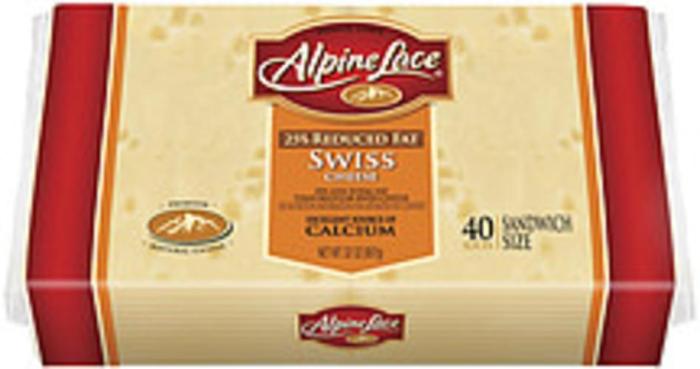
Alpine Lace Swiss cheese can be a valuable addition to a balanced diet, contributing essential nutrients while offering delicious versatility. Its nutritional profile makes it a suitable choice for individuals looking to incorporate more dairy into their meals, while remaining mindful of overall health goals. Understanding its role within a broader dietary context is key to maximizing its benefits.Alpine Lace Swiss cheese offers a good source of protein, calcium, and vitamin B12, all crucial for maintaining strong bones, healthy muscles, and a robust immune system.
Its relatively lower lactose content compared to some other cheeses also makes it a potentially better option for individuals with mild lactose intolerance.
Right, so Alpine Lace Swiss, low-fat, right? Good for a quick snack, innit? But if you’re after something a bit different, check out the chevre cheese nutrition facts – that goat’s cheese is proper creamy. Anyway, back to the Swiss – it’s still a decent source of protein, especially if you’re watching your calories.
Nutritional Benefits Compared to Other Dairy Products
Alpine Lace Swiss cheese compares favorably to other dairy products in several key areas. While similar in calcium content to many cheeses, its protein content is relatively high, making it a satisfying and nutritious snack or meal addition. Compared to milk, it offers a more concentrated source of protein and calcium, with less lactose. In contrast to yogurt, it offers a different texture and flavor profile, allowing for greater dietary variety.
However, it’s important to note that the specific nutritional content varies slightly depending on the fat content (e.g., reduced-fat vs. full-fat).
Dietary Considerations for Alpine Lace Swiss Cheese Consumption
Individuals with lactose intolerance should consume Alpine Lace Swiss cheese in moderation and monitor their response. While it generally has lower lactose content than some other cheeses, the amount that an individual can tolerate varies. Those with high cholesterol should choose reduced-fat or low-fat varieties to manage their intake of saturated fat. Furthermore, it’s crucial to remember that cheese, including Alpine Lace Swiss, is relatively high in sodium, so individuals watching their sodium intake should be mindful of portion sizes.
Sample Meal Plan Incorporating Alpine Lace Swiss Cheese
A balanced meal plan incorporating Alpine Lace Swiss cheese can be easily created. The following examples showcase its versatility:
- Breakfast: Scrambled eggs with diced Alpine Lace Swiss cheese and spinach, served with whole-wheat toast.
- Lunch: A salad with grilled chicken, mixed greens, and crumbled Alpine Lace Swiss cheese, dressed with a light vinaigrette.
- Dinner: Quiche Lorraine with Alpine Lace Swiss cheese, featuring a crust made from whole-wheat flour.
- Snack: Apple slices with a small portion of Alpine Lace Swiss cheese.
These examples demonstrate how Alpine Lace Swiss cheese can be integrated into a balanced diet across various meal types. Remember to consider portion sizes and individual dietary needs when incorporating it into your daily meals.
Health Implications and Considerations
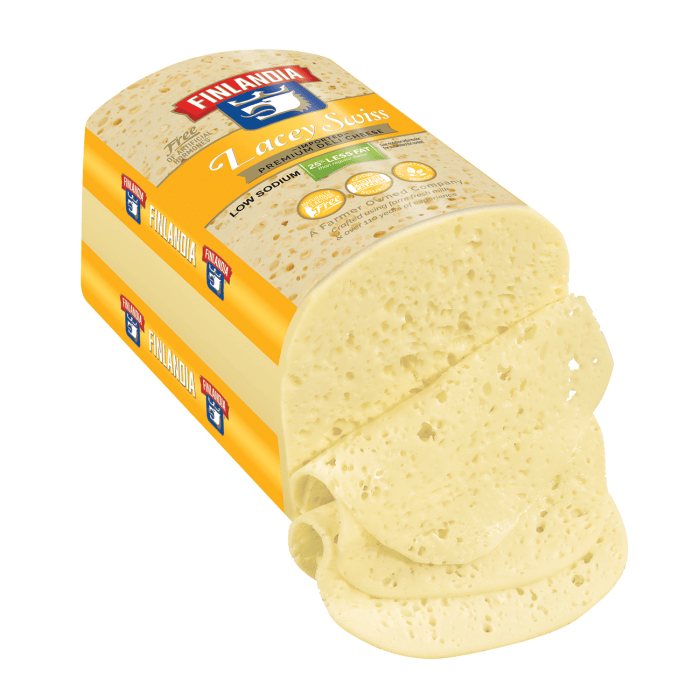
Alpine Lace Swiss cheese, while a delicious addition to any meal, offers a unique nutritional profile that presents both benefits and considerations for health-conscious individuals. Understanding its impact on various aspects of well-being is crucial for informed consumption. This section explores the potential positive and negative health implications associated with Alpine Lace Swiss cheese, providing guidance on incorporating it into a balanced diet.
Bone Health and Protein Contribution
Alpine Lace Swiss cheese is a good source of calcium and protein, both essential for maintaining strong bones. Calcium is the primary mineral component of bone, and adequate intake is vital for bone density and preventing conditions like osteoporosis. The protein in Alpine Lace Swiss cheese contributes to bone health by supporting the production of collagen, a key protein in bone structure.
A serving of Alpine Lace Swiss cheese contributes significantly towards the recommended daily intake of both calcium and protein, making it a valuable addition to a diet focused on bone health. For example, a single ounce of Swiss cheese can provide approximately 20% of the recommended daily allowance of calcium.
Saturated Fat Intake and Potential Negative Effects
While Alpine Lace Swiss cheese offers nutritional benefits, it’s also relatively high in saturated fat. Excessive saturated fat consumption is linked to increased levels of LDL cholesterol (“bad” cholesterol), which can contribute to heart disease. Therefore, moderate consumption of Alpine Lace Swiss cheese is recommended to minimize the potential negative impact of saturated fat on cardiovascular health. Individuals with pre-existing heart conditions or high cholesterol should consult with their healthcare provider regarding appropriate cheese intake.
Careful portion control is key to enjoying the benefits of Alpine Lace Swiss cheese without overdoing the saturated fat.
Sodium Content and Blood Pressure
Alpine Lace Swiss cheese, like many cheeses, contains a notable amount of sodium. High sodium intake is a significant risk factor for high blood pressure (hypertension). Compared to some other cheeses, Alpine Lace Swiss cheese’s sodium content may be moderate to high, depending on the specific product and preparation. Individuals with hypertension or those at risk for developing it should monitor their sodium intake carefully and consider choosing lower-sodium cheese options or consuming Alpine Lace Swiss cheese in moderation.
Checking the nutrition label for sodium content per serving is crucial for informed decision-making.
Incorporating Alpine Lace Swiss Cheese into a Heart-Healthy Diet
It is possible to enjoy the benefits of Alpine Lace Swiss cheese while maintaining a heart-healthy diet. Careful planning and portion control are essential.
- Choose low-fat or reduced-fat varieties of Alpine Lace Swiss cheese when available. These options often reduce saturated fat content without significantly compromising the taste or nutritional value.
- Limit portion sizes. Instead of adding a large amount of cheese to a meal, use smaller portions strategically. A few slices on a salad or a thin layer on a sandwich can provide flavor and nutrients without excessive saturated fat.
- Balance cheese intake with other heart-healthy foods. Include plenty of fruits, vegetables, whole grains, and lean protein sources in your diet to counterbalance the saturated fat in cheese.
- Substitute other healthy protein sources. On some days, replace Alpine Lace Swiss cheese with lean protein sources like chicken, fish, beans, or lentils to diversify your nutrient intake and reduce saturated fat consumption.
Top FAQs: Alpine Lace Swiss Cheese Nutrition
What is the shelf life of Alpine Lace Swiss cheese?
The shelf life varies depending on storage conditions. Generally, unopened Alpine Lace Swiss cheese should be consumed within the date printed on the packaging. Once opened, store it properly refrigerated to maintain freshness and prevent spoilage.
Is Alpine Lace Swiss cheese suitable for vegetarians?
Yes, Alpine Lace Swiss cheese is suitable for vegetarians as it is made from milk and does not contain any animal products besides dairy.
Can I freeze Alpine Lace Swiss cheese?
While freezing cheese can alter its texture, it’s possible to freeze Alpine Lace Swiss cheese. Wrap it tightly in freezer-safe material to prevent freezer burn. The texture may change upon thawing, but it will still be safe to consume.
How does the sodium content of Alpine Lace Swiss cheese compare to other cheeses?
The sodium content varies between different brands and types of cheese. Checking the nutrition label of your specific Alpine Lace Swiss cheese and comparing it to the labels of other cheeses will give you a precise comparison. Generally, hard cheeses tend to have higher sodium content than soft cheeses.

